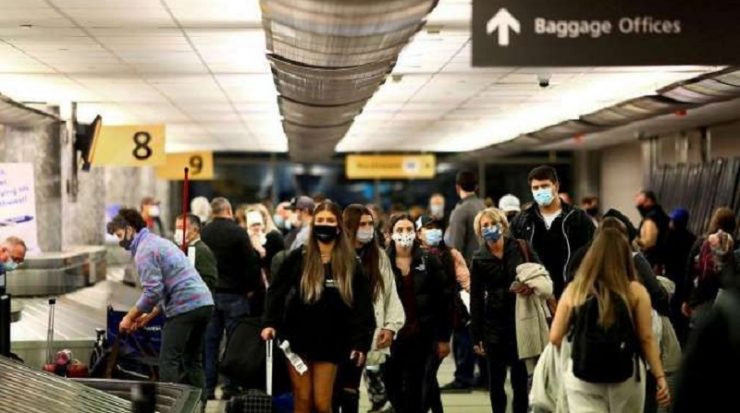CLUB PARTIES, cinemas opening, no longer wearing masks in public, became commonplace in Europe and North America. Many countries are easing COVID-19 restrictions on hopes the Omicron wave has passed its peak.
The initial step to loosen COVID-19 restrictions based on the number of cases declining or leveling off in recent days, became a turning point for the coronavirus pandemic that has lasted two years.
The Omicron variant has triggered more cases worldwide over the past 10 weeks than any infection in 2020. However, the World Health Organization (WHO) this week said that some countries could now carefully consider easing restrictions if they have high levels of immunity, a strong health care system, and epidemiological trends that are heading in the right direction.
New COVID-19 cases worldwide for the period 24-30 January 2022 were similar to the previous week’s figures, although new deaths rose 9 percent to more than 59,000.
The desire to relax around coronavirus restrictions was expressed in countries in Europe, South Africa and the United States. In the UK and US, as in South Africa before, COVID-19 cases skyrocketed at first, but are now falling rapidly.
Next week, New York’s governor plans to review whether to maintain the mask-wearing mandate as cases and hospitalizations decline. Overall, the US is on track, with infections dropping from an average of more than 800,000 per day 2.5 weeks ago to 430,000 this week.
Several European countries have ended COVID-19 restrictions
The UK, France, Ireland, the Netherlands and several Nordic countries have taken steps to end or relax their restrictions. In some places, such as Norway and Denmark, easing is taking place even though the number of cases is still near high levels. Some governments are basically betting that the pandemic is receding.
“Rest assured that the worst days are behind us,” said Turkey’s Health Minister Fahrettin Koca, with the country’s daily infection toll topping 100,000 on Tuesday (1/02), a record high in the country of more than 80 million.
Last week, Britain also ended almost all restrictions. The use of masks is no longer required in public places, proof of vaccine is no longer required to enter public places, and work from home orders have been lifted. One condition remaining, namely those who test positive still have to undergo self-isolation.
On Tuesday (1/02), Norway lifted a ban on serving alcohol after 11 p.m. and a limit on private gatherings of no more than 10 people. People can sit together again and sporting events can go on as before the pandemic.
“Now is the time for us to take back our daily lives,” said Norwegian Health Minister Ingvild Kjerkol, Tuesday (1/02). However, in the Danish capital, there are still some wearing masks in public spaces.”
“I still wear a mask because I want to protect myself and others who are not in very good health, or who have health problems,” said Kjeld Rasmussen, an 86-year-old Copenhagen resident. “I have several things (health conditions). And for me, it’s also a good way to say to other people, ‘Keep your distance.”
Switzerland on Wednesday (02/02), scrapped its work-at-home and quarantine requirements and announced plans for another easing of restrictions in the coming weeks, saying: “Despite high infection rates, hospitals have not been overwhelmed and intensive care unit occupancy has fallen. drastic.”
Experts remind people not to underestimate Omicron
“We are concerned about the narrative in some countries that because of vaccines – and because of the high transmissibility of Omicron, as well as its lower severity – preventing transmission is no longer possible,” said WHO Director-General Tedros Adhanom Ghebreyesus.
Head of WHO Health Emergencies Program Dr. Michael Ryan warned that political pressure could cause some countries to reopen restrictions too soon – and “it would result in unnecessary contagion, unnecessarily severe illness and unnecessary deaths.”
Not all developed countries relax COVID-19 restrictions
In Germany, where infections are still recording daily records, restrictions on private gatherings and a requirement for people to show proof of vaccination or recovery to enter stores that are not providers of daily necessities, remain in place.
“I think when we feel that we can relax responsibly, the federal and state governments will take that step still a bit premature,” German government spokesman Steffen Hebestreit said Monday.
Other continents are even more cautious. The Pacific Island nation of Tonga went into lockdown on Wednesday (02/02) after finding cases of the coronavirus in two port workers who helped distribute aid in the aftermath of the volcanic eruption and tsunami.
Just days ahead of the Olympics, China is sticking to its zero COVID policy, imposing strict lockdowns and quarantines when cases are detected, requiring the use of masks on public transport, and requiring people to show “green” status on health apps to enter mostly restaurants and shops.
Dr. Atiya Mosam of the South African Public Health Association said such measures are “practical steps to acknowledge that COVID-19 will persist, even though we may have milder symptoms.”
“We recognize how transmission occurs, while essentially balancing people’s needs to live their lives,” said Mosam. [dw.com/photo special]
















